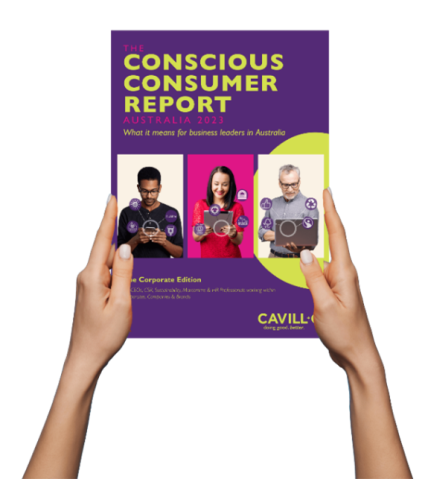What stands out most to me in the latest Conscious Consumer Report are the findings that explain behaviour. Conscious consumer behaviour is intriguing, and I’ve been asked several times what it is. Here’s a definition from the Report:

A conscious consumer has “more awareness of how your consumption impacts society at large, and using the power of your purchase to bring about change.”
Conscious consumerism encompasses a broader range of consumer attitudes and resulting behaviours like supporting companies/brands that:
- align with your ethics and values (and/or boycotting those that contradict them)
- are more sustainable and have less environmental impact
- partner with/support charities
- have locally made products
- stand up for social issues you care about (and/or exposing companies that are deceptive or misleading).
A conscious consumer may also actively promote companies/brands to family, friends and social media followers and protest against those they dislike.
While I haven't considered myself a dedicated "conscious consumer", I can see that my behaviour has been influenced by companies that communicate those positive traits listed above.
The report goes into what’s behind this type of behaviour and what this means for companies.
Why?
“People want to do something to make the world better, but often, aren’t sure what to do.”
What impact does it have?
“It’s a way companies/brands can bond emotionally with consumers.” It also leaves consumers feeling good knowing their purchase has made a difference in the world.
What does this mean?
“Doing Good is no longer just good for business – it’s crucial for business. It also strengthens the non-profit sector who, in turn, will provide better opportunities for vulnerable people. Australia can only prosper if both the economy AND society are flourishing.”
Reading these findings in the Report reminded me of my own experiences where I can relate. Here’s an example:

Having an Italian family background, pasta is a staple in my household. In the past we’d normally choose between the more well-known pasta brands. However, earlier this year, as I was scanning the shelves at Woolies, I noticed the Vetta ❤️ Rural Aid range. I had a closer look and saw that 10c from every packet sold goes back to Rural Aid to fund much needed rural initiatives.
Looking more closely into the brand, I learnt they are Australian owned and support responsible farming by using “100% responsibly grown Australian Durum Wheat Semolina to help protect the Australian land for future generations”. This all appealed to me. It is now a regular in my shopping basket. Why? Because this makes me feel good, it’s a simple way to help make a difference and Vetta does a great job of communicating how they are making a difference in society! Well done Vetta!
Turns out I’m one of the estimated 27% of Australians who in the past year have switched from my usual product/service to another, to support a cause I care about (and of those, I’m in the third who switched everyday food items). And I join the seven in 10 who see a company getting behind a cause as more genuine if there is a charity partner involved.
So, there you have it, I’ve switched brands before, and it’s likely I’ll do it again in the next year (together with an estimated 54% of Australians). Upon reflection, perhaps some of my consumption behaviour is conscious. What I realised through my personal experience is that I value the principles behind conscious consumerism and would encourage organisations to consider this with any future strategic marketing and communications campaigns.
To find out more, you can watch a short video (Warning: you may get a glimpse of this researcher) or you can download the report for free at https://www.cavill.com.au/research
Thanks for reading my self-reflection and as we move into the Christmas season, I encourage you to go forth and consume consciously 😊.